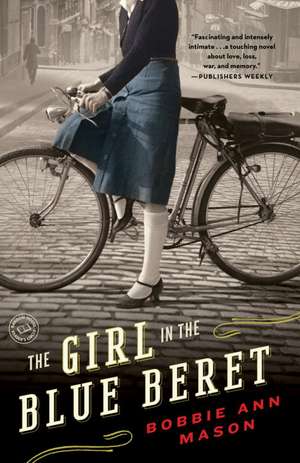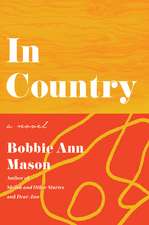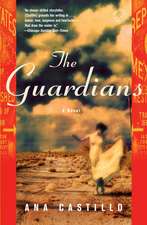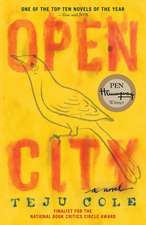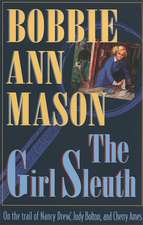The Girl in the Blue Beret
Autor Bobbie Ann Masonen Limba Engleză Paperback – 30 iun 2012
At twenty-three, Marshall Stone was a confident, cocksure U.S. flyboy stationed in England, with several bombing raids in a B-17 under his belt. But when enemy fighters forced his plane to crash-land in a Belgian field during a mission to Germany, Marshall had to rely solely on the kindness of ordinary Belgian and French citizens to help him hide from and evade the Nazis. Decades later, restless and at the end of his career as an airline pilot, Marshall returns to the crash site and finds himself drawn back in time, unable to stop thinking about the people who risked their lives to save Allied pilots like him. Most of all, he is obsessed by the girl in the blue beret, a courageous young woman who protected and guided him in occupied Paris.
Framed in spellbinding, luminous prose, Marshall’s search for her gradually unfolds, becoming a voyage of discovery that reveals truths about himself and the people he knew during the war. Deeply beautiful and impossible to put down, The Girl in the Blue Beret is an unforgettable story—intimate, affecting, exquisite—of memories, second chances, and one intrepid girl who risked it all for a stranger.
Look for special features inside.
Join the Circle for author chats and more.
RandomHouseReadersCircle.com
Preț: 113.78 lei
Nou
Puncte Express: 171
Preț estimativ în valută:
21.77€ • 22.78$ • 18.09£
21.77€ • 22.78$ • 18.09£
Carte tipărită la comandă
Livrare economică 03-17 aprilie
Preluare comenzi: 021 569.72.76
Specificații
ISBN-13: 9780812978872
ISBN-10: 0812978870
Pagini: 360
Dimensiuni: 131 x 203 x 21 mm
Greutate: 0.28 kg
Editura: Random House Trade
ISBN-10: 0812978870
Pagini: 360
Dimensiuni: 131 x 203 x 21 mm
Greutate: 0.28 kg
Editura: Random House Trade
Recenzii
“A spellbinding tale of war, love and survival . . . storytelling at its best.”—Associated Press
“A deeply moving, relevant novel . . . What a stirring tribute to the Resistance this novel is; along with a heartfelt salute to the ordinary women and even girls who sprinkled sand in the gears of Hitler’s army, fighting back in innumerable subtle ways against the Occupation.”—The Washington Post
“[Bobbie Ann Mason] writes with care and grace, creating fully developed, complicated characters that readers will care for and remember long after finishing the book.”—Pittsburgh Post-Gazette
“Ushering her readers back and forth across the decades, [Mason] perfectly weaves history with fiction. . . . [A] near-perfect war story.”—USA Today
“[An] impressive, impassioned new novel. The unforgettable story . . . is a gripping tale of redemption.”—The Miami Herald
“A deeply moving, relevant novel . . . What a stirring tribute to the Resistance this novel is; along with a heartfelt salute to the ordinary women and even girls who sprinkled sand in the gears of Hitler’s army, fighting back in innumerable subtle ways against the Occupation.”—The Washington Post
“[Bobbie Ann Mason] writes with care and grace, creating fully developed, complicated characters that readers will care for and remember long after finishing the book.”—Pittsburgh Post-Gazette
“Ushering her readers back and forth across the decades, [Mason] perfectly weaves history with fiction. . . . [A] near-perfect war story.”—USA Today
“[An] impressive, impassioned new novel. The unforgettable story . . . is a gripping tale of redemption.”—The Miami Herald
Notă biografică
Bobbie Ann Mason is the author of In Country, Shiloh and Other Stories, An Atomic Romance, Nancy Culpepper, and a memoir, Clear Springs. She is the winner of the PEN/Hemingway Award, two Southern Book Awards, and numerous other prizes, including the O. Henry and the Pushcart. She was a finalist for the National Book Critics Circle Award, the American Book Award, the PEN/Faulkner Award, and the Pulitzer Prize. She is writer-in-residence at the University of Kentucky.
From the Hardcover edition.
From the Hardcover edition.
Extras
1.
As the long field came into view, Marshall Stone felt his breathing quicken, a rush of doves flying from his chest. The landscape was surprisingly familiar, its contours and borders fresh in his memory, even though he had been here only fleetingly thirty-six years ago. Lucien Lombard, who had brought him here today, knew the field intimately, for it had been in his family for generations.
“It was over there beside that tree, monsieur,” Lucien said, pointing toward the center of the field, where an awkward sycamore hovered over a patch of unruly vegetation.
“There was no tree then,” Marshall said.
“That is true.”
They walked through the furrowed field toward the tree, Lucien’s sturdy brown boots mushing the mud, Marshall following in borrowed Wellingtons. He was silent, his memory of the crash landing superimposed on the scene in front of him, as if there were a small movie projector in his mind. The Flying Fortress, the B-17, the heavy bomber the crew called the Dirty Lily, had been returning from a mission to Frankfurt.
“The airplane came down just there,” said Lucien as they neared the tree.
Lucien was elderly—probably in his eighties, Marshall thought—but he had a strong, erect physique, and he walked with a quick, determined step. His hair was thin, nearly white, his face smooth and firm.
“Normally a farmer would not permit a tree to thrive in his field,” he said. “But this tree marks the site.”
Unexpectedly, Marshall Stone began to cry. Embarrassed, he turned his face aside. He was a captain of transatlantic jumbo jets, a man who did not show weakness. He was alarmed by his emotion.
Lucien Lombard nodded. “I know, monsieur,” he said.
In Marshall’s mind, the crumpled B-17 lay before him in the center of the field. He recalled that the plane had been lined up with the neatly plowed furrows.
The deep, rumbling sound of a vast formation of B-17s roared through Marshall’s memory now. The steady, violent, rocking flight toward target. The sight of Focke-Wulf 190s—angry hornets darting crazily. The black bursts of flak floating like tumbleweeds strewn on a western highway. The fuselage flak-peppered. Slipping down into the cloud deck, flying for more than an hour unprotected. Over Belgium, hit again. The nose cone shattering. The pilot panicking.
Marshall, the co-pilot, took the controls and brought the Dirty Lily down. A belly landing on this foreign soil. There was no time to jettison the ball turret. Only as they were coming down did Marshall see that Lawrence Webb, the pilot, was unconscious. The Fort grazed the top of a tall hedgerow and slid in with a jolt, grinding to a hard stop. The crew scrambled out. Marshall and the flight engineer wrestled Webb’s slack body from the plane. The navigator’s face was torn, bloodied. The fuselage was burning. Machine-gun rounds were exploding at the gun stations. Marshall didn’t see the tail gunner anywhere. The left waist gunner lay on the ground, motionless.
Marshall had been just twenty-three years old then. Now he was nearly sixty, and he had come to see this place again at last. He was crying for the kids in the B-17, the youngsters who had staked their lives on their Flying Fortress. He hadn’t known he had pent up such a reservoir of emotion, even though he probably thought about the downing of the B-17 every day. He willed his tears to stop.
Lucien Lombard had seen the plane come down near the village, and he rushed to help the crew, but Marshall didn’t remember him.
Now Lucien said, “It is like yesterday.”
Marshall toed a weed-topped clod of dirt. “The worst day of my life,” he said. “Some bad memories.”
“Never mind, monsieur. It had its part.”
Several people were crossing the field, headed toward them. They had arrived in a gray van with the name of a hardware store on the side.
“Everyone from the village has heard of your visit,” said Lucien. “You are a hero.”
“Non. I did very little.” Marshall was ashamed.
Lucien introduced him to the group. They were all smiling at him and speaking rapidly. When Marshall could not follow some of their thickly accented French, Lucien explained that everyone there remembered the crash. Three families had sheltered members of the crew, and Dr. Bequet had treated the wounded.
“I’m very grateful,” Marshall said, shaking the doctor’s hand.
“It was necessary to help.”
More introductions and small talk followed. Marshall noticed two men scanning the ground. Lucien explained that people still found pieces of metal there—bullet casings, rivets, and once even a warped propeller blade. Marshall thought of how he had torn up the field when he came zigzagging down that day.
A man in a cloth cap and wool scarf stepped forward and touched Marshall’s arm.
“Oui, it is sad, monsieur,” the man said. He regarded Marshall in a kindly way and smiled. His face was leathery but younger than Marshall’s. He seemed familiar.
“You were the boy who helped me!” Marshall said, astonished.
“Oui. C’est moi.”
“You offered me a cigarette.”
The man laughed. His taut, weathered cheeks seemed to blush. “Bien sûr. I would never forget that day. The cigarettes I had obtained for my father.”
“That was my very first Gauloises,” Marshall said.
“You were my first Américain,” the man said, smiling. “I am Henri Lechat.”
They shook hands, the younger man first removing his glove.
“You warned me that the Germans were coming,” Marshall said.
Henri nodded. “It is true. You had no French then, and I had no English.”
“But I knew. We communicated somehow.”
Marshall’s voice broke on the word communicated.
“We will never forget, monsieur.”
“You told me to run,” Marshall said, recalling how he had stowed the cigarette in the inner pocket of his leather jacket. Now he felt his tears well up again.
Henri tugged on his scarf. “I told you to hide in the woods, and you comprehended.”
Recalling the boy’s urgency, Marshall tried to laugh. Henri had raced up, calling a warning. Pointing back the way he had come, he cried, “Les Allemands! Les Allemands!” Then, pointing to the woods in the other direction, he shouted, “Allez-y!” Marshall did not see any Germans, and he would not leave until all the crew was out. The bombardier was wounded in the shoulder, and the navigator had a shattered leg. The tail gunner appeared; he had hopped out easily. The left waist gunner was unconscious and had to be pulled from the fuselage window. Marshall was relieved to see the ball-turret gunner, who was limping toward the church with a man carrying a shovel. Someone said the right waist gunner had parachuted. The pilot was lying on the frozen ground, his eyes closed. Fire was leaping from the plane.
Marshall knelt by Webb, trying to wake him. Nothing. Someone squatted beside Marshall and opened Webb’s jacket.
“Docteur,” the woman said, pointing toward the village. She pointed in the opposite direction, toward the woods, and said, “Go.”
Marshall stood. The flight engineer appeared at his side. “Let’s go,” he said. “Everybody’s out.”
Several of the villagers were making urgent gestures toward the road. German troops would be here in moments. Marshall knew that they converged on every fallen plane, to arrest the Allied aviators and to salvage the wrecked metal for their own planes. The German fighter that had downed them was circling low overhead. Marshall began running toward the woods.
Had the Germans shot anyone from the village for helping the American flyers? Marshall wondered now, but he did not want to ask. He had tried to be sure all the crew were out, and then he left the scene. In the years after, he didn’t probe into the aftermath. He lived another life.
“We were so thankful to you, monsieur,” one of the men was saying. “When your planes flew over we knew we would be liberated one day.”
Marshall nodded.
A stocky woman with gray, thick hair and a genial, wrinkled face said, “The airplanes flying toward Germany in those days—there were hundreds of them. We rejoiced to see them crossing the sky.”
Henri kicked dirt from his leather boot. “I didn’t know at that age everything that was understood by the adults. But I knew the deprivation, the difficulties, the secrecy. Even the children knew the crisis.”
Cautiously, Marshall asked, “Did the Germans arrest anybody for helping us?”
“Oh, non, monsieur.” Henri paused. “Not that day.”
Lucien Lombard clasped Henri’s shoulder and said, “The father of this one was killed—shot on his bicycle, on his way home after convoying one of your aviateurs across the border to France.”
Henri said, “I had to grow up quickly. I had the responsibilities then for my mother and my sisters.”
Lucien said, “His family hid that aviateur in their barn for a time.”
Marshall recoiled. He could see the waist gunner lying motionless across the furrows. He saw himself running into the woods. He saw the boy’s face. The plane was on fire.
Marshall had decided to return to this place finally, knowing it was time to confront his past failure. He had expected to be alone in the field, and he had not thought anyone would remember. The news of the death of the boy’s father jolted him. He had never heard about that. In all these years, he had thought little about the people who had come running to the downed airplane. He had felt such a profound defeat in the war that he had not wanted to return here. During the war, more than anything, he had wanted to be heroic. But he was no hero. He had felt nothing but bitter disappointment that he didn’t get to complete his bombing missions against Nazi Germany. And what happened later, as he skulked through France, was best forgotten, he had thought.
Marshall was a widower. His wife, Loretta, had died suddenly two years before, and the loss still seemed unbelievable, but now he began to feel his grief lift, like the morning fog disappearing above a waiting airport.
As the long field came into view, Marshall Stone felt his breathing quicken, a rush of doves flying from his chest. The landscape was surprisingly familiar, its contours and borders fresh in his memory, even though he had been here only fleetingly thirty-six years ago. Lucien Lombard, who had brought him here today, knew the field intimately, for it had been in his family for generations.
“It was over there beside that tree, monsieur,” Lucien said, pointing toward the center of the field, where an awkward sycamore hovered over a patch of unruly vegetation.
“There was no tree then,” Marshall said.
“That is true.”
They walked through the furrowed field toward the tree, Lucien’s sturdy brown boots mushing the mud, Marshall following in borrowed Wellingtons. He was silent, his memory of the crash landing superimposed on the scene in front of him, as if there were a small movie projector in his mind. The Flying Fortress, the B-17, the heavy bomber the crew called the Dirty Lily, had been returning from a mission to Frankfurt.
“The airplane came down just there,” said Lucien as they neared the tree.
Lucien was elderly—probably in his eighties, Marshall thought—but he had a strong, erect physique, and he walked with a quick, determined step. His hair was thin, nearly white, his face smooth and firm.
“Normally a farmer would not permit a tree to thrive in his field,” he said. “But this tree marks the site.”
Unexpectedly, Marshall Stone began to cry. Embarrassed, he turned his face aside. He was a captain of transatlantic jumbo jets, a man who did not show weakness. He was alarmed by his emotion.
Lucien Lombard nodded. “I know, monsieur,” he said.
In Marshall’s mind, the crumpled B-17 lay before him in the center of the field. He recalled that the plane had been lined up with the neatly plowed furrows.
The deep, rumbling sound of a vast formation of B-17s roared through Marshall’s memory now. The steady, violent, rocking flight toward target. The sight of Focke-Wulf 190s—angry hornets darting crazily. The black bursts of flak floating like tumbleweeds strewn on a western highway. The fuselage flak-peppered. Slipping down into the cloud deck, flying for more than an hour unprotected. Over Belgium, hit again. The nose cone shattering. The pilot panicking.
Marshall, the co-pilot, took the controls and brought the Dirty Lily down. A belly landing on this foreign soil. There was no time to jettison the ball turret. Only as they were coming down did Marshall see that Lawrence Webb, the pilot, was unconscious. The Fort grazed the top of a tall hedgerow and slid in with a jolt, grinding to a hard stop. The crew scrambled out. Marshall and the flight engineer wrestled Webb’s slack body from the plane. The navigator’s face was torn, bloodied. The fuselage was burning. Machine-gun rounds were exploding at the gun stations. Marshall didn’t see the tail gunner anywhere. The left waist gunner lay on the ground, motionless.
Marshall had been just twenty-three years old then. Now he was nearly sixty, and he had come to see this place again at last. He was crying for the kids in the B-17, the youngsters who had staked their lives on their Flying Fortress. He hadn’t known he had pent up such a reservoir of emotion, even though he probably thought about the downing of the B-17 every day. He willed his tears to stop.
Lucien Lombard had seen the plane come down near the village, and he rushed to help the crew, but Marshall didn’t remember him.
Now Lucien said, “It is like yesterday.”
Marshall toed a weed-topped clod of dirt. “The worst day of my life,” he said. “Some bad memories.”
“Never mind, monsieur. It had its part.”
Several people were crossing the field, headed toward them. They had arrived in a gray van with the name of a hardware store on the side.
“Everyone from the village has heard of your visit,” said Lucien. “You are a hero.”
“Non. I did very little.” Marshall was ashamed.
Lucien introduced him to the group. They were all smiling at him and speaking rapidly. When Marshall could not follow some of their thickly accented French, Lucien explained that everyone there remembered the crash. Three families had sheltered members of the crew, and Dr. Bequet had treated the wounded.
“I’m very grateful,” Marshall said, shaking the doctor’s hand.
“It was necessary to help.”
More introductions and small talk followed. Marshall noticed two men scanning the ground. Lucien explained that people still found pieces of metal there—bullet casings, rivets, and once even a warped propeller blade. Marshall thought of how he had torn up the field when he came zigzagging down that day.
A man in a cloth cap and wool scarf stepped forward and touched Marshall’s arm.
“Oui, it is sad, monsieur,” the man said. He regarded Marshall in a kindly way and smiled. His face was leathery but younger than Marshall’s. He seemed familiar.
“You were the boy who helped me!” Marshall said, astonished.
“Oui. C’est moi.”
“You offered me a cigarette.”
The man laughed. His taut, weathered cheeks seemed to blush. “Bien sûr. I would never forget that day. The cigarettes I had obtained for my father.”
“That was my very first Gauloises,” Marshall said.
“You were my first Américain,” the man said, smiling. “I am Henri Lechat.”
They shook hands, the younger man first removing his glove.
“You warned me that the Germans were coming,” Marshall said.
Henri nodded. “It is true. You had no French then, and I had no English.”
“But I knew. We communicated somehow.”
Marshall’s voice broke on the word communicated.
“We will never forget, monsieur.”
“You told me to run,” Marshall said, recalling how he had stowed the cigarette in the inner pocket of his leather jacket. Now he felt his tears well up again.
Henri tugged on his scarf. “I told you to hide in the woods, and you comprehended.”
Recalling the boy’s urgency, Marshall tried to laugh. Henri had raced up, calling a warning. Pointing back the way he had come, he cried, “Les Allemands! Les Allemands!” Then, pointing to the woods in the other direction, he shouted, “Allez-y!” Marshall did not see any Germans, and he would not leave until all the crew was out. The bombardier was wounded in the shoulder, and the navigator had a shattered leg. The tail gunner appeared; he had hopped out easily. The left waist gunner was unconscious and had to be pulled from the fuselage window. Marshall was relieved to see the ball-turret gunner, who was limping toward the church with a man carrying a shovel. Someone said the right waist gunner had parachuted. The pilot was lying on the frozen ground, his eyes closed. Fire was leaping from the plane.
Marshall knelt by Webb, trying to wake him. Nothing. Someone squatted beside Marshall and opened Webb’s jacket.
“Docteur,” the woman said, pointing toward the village. She pointed in the opposite direction, toward the woods, and said, “Go.”
Marshall stood. The flight engineer appeared at his side. “Let’s go,” he said. “Everybody’s out.”
Several of the villagers were making urgent gestures toward the road. German troops would be here in moments. Marshall knew that they converged on every fallen plane, to arrest the Allied aviators and to salvage the wrecked metal for their own planes. The German fighter that had downed them was circling low overhead. Marshall began running toward the woods.
Had the Germans shot anyone from the village for helping the American flyers? Marshall wondered now, but he did not want to ask. He had tried to be sure all the crew were out, and then he left the scene. In the years after, he didn’t probe into the aftermath. He lived another life.
“We were so thankful to you, monsieur,” one of the men was saying. “When your planes flew over we knew we would be liberated one day.”
Marshall nodded.
A stocky woman with gray, thick hair and a genial, wrinkled face said, “The airplanes flying toward Germany in those days—there were hundreds of them. We rejoiced to see them crossing the sky.”
Henri kicked dirt from his leather boot. “I didn’t know at that age everything that was understood by the adults. But I knew the deprivation, the difficulties, the secrecy. Even the children knew the crisis.”
Cautiously, Marshall asked, “Did the Germans arrest anybody for helping us?”
“Oh, non, monsieur.” Henri paused. “Not that day.”
Lucien Lombard clasped Henri’s shoulder and said, “The father of this one was killed—shot on his bicycle, on his way home after convoying one of your aviateurs across the border to France.”
Henri said, “I had to grow up quickly. I had the responsibilities then for my mother and my sisters.”
Lucien said, “His family hid that aviateur in their barn for a time.”
Marshall recoiled. He could see the waist gunner lying motionless across the furrows. He saw himself running into the woods. He saw the boy’s face. The plane was on fire.
Marshall had decided to return to this place finally, knowing it was time to confront his past failure. He had expected to be alone in the field, and he had not thought anyone would remember. The news of the death of the boy’s father jolted him. He had never heard about that. In all these years, he had thought little about the people who had come running to the downed airplane. He had felt such a profound defeat in the war that he had not wanted to return here. During the war, more than anything, he had wanted to be heroic. But he was no hero. He had felt nothing but bitter disappointment that he didn’t get to complete his bombing missions against Nazi Germany. And what happened later, as he skulked through France, was best forgotten, he had thought.
Marshall was a widower. His wife, Loretta, had died suddenly two years before, and the loss still seemed unbelievable, but now he began to feel his grief lift, like the morning fog disappearing above a waiting airport.
Descriere
Inspired by the wartime experiences of her father-in-law, Mason has crafted the profoundly moving story of an American World War II pilot shot down in Occupied Europe, and his odyssey of discovery, decades later, as he learns about those who helped him escape in 1944.
